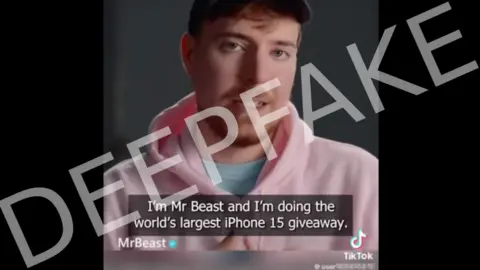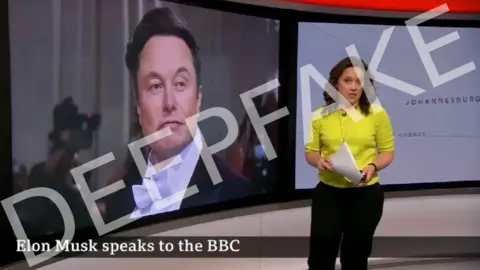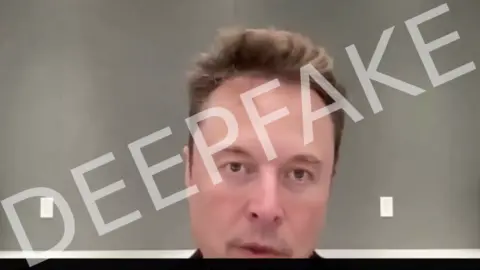MrBeast and BBC stars used in deepfake scam videos
 BBC
BBCThe world's biggest YouTuber, MrBeast, and two BBC presenters have been used in deepfake videos to scam unsuspecting people online.
Deepfakes use artificial intelligence (AI) to make a video of someone by manipulating their face or body.
One such video appeared on TikTok this week, claiming to be MrBeast offering people new iPhones for $2 (£1.65).
Meanwhile, likenesses of BBC stars Matthew Amroliwala and Sally Bundock were used to promote a known scam.
The video on Facebook showed the journalists "introducing" Elon Musk, the billionaire owner of X, formerly Twitter, purportedly promoting an investment opportunity.
Similar historical videos have claimed to show him giving away money and cryptocurrency.
The BBC approached Facebook-owner Meta from comment and the content has since been removed.
Previously, the videos were gated by an image warning viewers that they contained false information checked by independent fact-checkers FullFact, which first reported the issue.
"We don't allow this kind of content on our platforms and have removed it," said a Meta spokesperson.
"We're constantly working to improve our systems and encourage anyone who sees content they believe breaks our rules to report it using our in-app tools so we can investigate and take action."
Meanwhile, a TikTok spokesperson said the company removed the MrBeast ad within a few hours of it being uploaded, and the account which posted it has been removed for violating its policies.
Allow X content?
TikTok specifically bars "synthetic media" which "contains the likeness (visual or audio) of a real person".
In a post on X viewed more than 28 million times, the YouTuber shared the fake video and asked if social media platforms were ready to handle the rise of these deepfakes.

'I've been done!'
BBC News presenter Sally Bundock
It was a normal Monday night and I was headed to bed early, as I was due in the BBC Newsroom at 3am on Tuesday.
My husband received a call from a friend. He then asked: "Sally have you interviewed Elon Musk lately?" "No... I wish," was my reply.
That was the beginning of my realisation that I'd been done.
A deepfake video of me, in the BBC News studio, apparently presenting a "breaking business news" story has been swirling around social media. It looks like me, it sounds like me, it is quite convincing, but it is not me. Wow, I was shocked.
In this brave new world, I wondered, was it just a matter of time? The mind boggles.
But once the hairs on the back of my neck had resettled, then followed the questions - what now? The concern is this fake video, created using Artificial Intelligence, is pointing viewers to a financial scam.
It claims, using the fake me that British users of a new investment project created by Elon Musk can receive a substantial return on investment - so much so that you can give up work.
It sounds too good to be true, and that is the key, it is too good to be true. It is a scam.

How to spot a deepfake video
There have been a series of high profile deepfakes in recent weeks, with Tom Hanks warning on Monday that an advert appearing to be fronted by him shilling a dental plan was not real.
As AI systems have grown in power and sophistication, so have concerns about their ability to create ever more realistic virtual versions of real people.
Generally speaking, the first clue that a video may not be what it seems is simply that it's offering something for nothing.
But the MrBeast video complicates this.
The YouTuber has made his name giving away cars, houses and cash - he even gave trick or treaters iPhones last year in Halloween - so it's easy to see how people might believe he was gifting these devices online.
But eagle-eyed viewers, and listeners, will be able to spot the tell tale signs that something is amiss.
The scammers have attempted to look legitimate by embedding in the video MrBeast's name in the bottom-left corner, as well as the blue verification mark used on many different social media platforms.
But TikTok videos automatically embed the actual name of the uploader underneath the TikTok logo itself.
The account that posted the video is not verified, and now no longer exists.
Meanwhile, in the videos featuring BBC presenters, the errors are more pronounced.

For example, in the Sally Bundock video, the "presenter" mispronounces 15 as "fife-teen", as well as oddly pronouncing project as "pro-ject".
She also says "more than $3bn 'were' invested in the new project", rather than "was invested".
These errors may be small, but as the technology advances and visual clues become less apparent, verbal errors - much like the spelling errors you often find in a scam email - can be a useful way to identify if something is fake.
The fakers have used a legitimate video of Sally Bundock presenting - at the time talking about Mr Musk taking over X - but making it seem like she's talking about an investment opportunity involving him.
In the Matthew Amroliwana video, there are some similar audio cues, with garbled sounds at the start of certain sentences.

There are plenty of indicators in this video that things aren't all they seem. The text is different to that used by BBC News, with spelling errors and odd phrasing.
But there is at least one tell tale visual error - where "Elon Musk" appears to have an eye on top of his left eye.
This type of glitch is common with deepfakes, and happens due to an issue with the technology.
But if you're ever unsure if a video is real or not, there is one golden rule to follow - unless MrBeast or Elon Musk is stood in front of you in real life, there's no such thing as a free iPhone.
What does the law say about deepfakes?
The issue becomes complicated because the laws are different in each country, says law professor Lilian Edwards.
"Which law applies in the cases of these kinds of copyright infringement aspects, where it's an American company being used, say to scam a British consumer using a Chinese platform," she asked.
"You could possibly use defamation laws, or data protection laws, where your voice or image is used without your permission and without a good cause."
But she warned against criminalising all deepfakes.
"If you start to criminalise making any deepfake, you're criminalising the special effects industry in films," she said.
"You're criminalising a lot of the art that people are generating."
